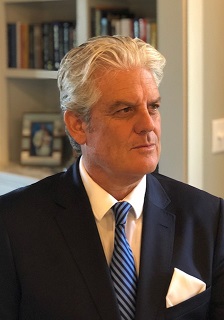From the CEO – May 2020

Dear Clients,
Summer is upon us. It’s a time to spend more of the day outdoors, pursuing recreational activities, and passing time with friends and family. That much of the world is ‘reopening’ after several months of C-19-induced lockdowns is also – like summer – a welcome sight.
What’s also upon us is a post C-19 world that is rife with a variety of new and often unexpected geopolitical risks. Tensions between the US and China are mounting with punitive actions on the horizon. Despite emergency lines of credit and repayment holidays extended by creditors to some emerging market borrowers sovereign debt loads and settlements schedules are still onerous. The US presidential campaign is gaining momentum and certainly promises to be one of the ugliest in recent memory. And the fallout from the virus ranges from severely wounded economies, to food shortages to social unrest.
A full measure of economic normalcy won’t return until there is a very effective therapeutic and/or a vaccine. Yet despite the myriad tragedies C-19 has spawned, there have been positive outcomes, both specific and general, and they have an effect on political risk and the way its assessed and measured.
As regular readers may know, I remain a big fan of the humanist tradition of thought and action. The term was initially applied by German academics of the early 19th century to writers in the 14th and 15th centuries who cast-off the immediate past in favor of a culture they thought to be akin to the classics of ancient Rome. The twin ideas of reason and nature held sway, and their outcomes were potentially far-reaching. Jacques Barzun in his classic, From Dawn to Decadence (2000), characterized the attributes well:
‘ …individual self-development, action rather than pious passivity, a life in which reason and will can be used both to improve worldly conditions and to observe the lessons that nature holds for the thoughtful.’
As Barzun made clear, the humanists were scholars but had little use for the ivory tower. Indeed, their cultural hero was Cicero, who is well known for his stance against dictatorial power, the supremacy of the individual, human compassion and action.
The humanist tradition is relevant in the immediate post C-19 world. Despite the more tumultuous world that we are witnessing, we have seen some remarkable things achieved by human thought and action. Residents throughout much of Europe (among other places) were able to harness the fortitude to remain in lockdown and help ‘flatten the curve.’ Health care workers everywhere faced considerable dangers in treating the infected. Firms and other organizations were able to continue to operate remotely. And one senses there is a new respect for a (cleaner) environment that became evident in many areas after months of human inactivity. In short, something worthy has come from the misfortune, so there is the potential to temper political risk. Individual self-interest and collective will can achieve remarkable things. Politicians and vested interests often cause more harm than good.
Jared Diamond expounded on this tendency of humans to achieve great things in the face of collective misfortune in a recent piece in the Financial Times, citing various international agreements, such as the Montreal Protocol (1987), which curtailed the global production and use of chlorofluorocarbons and other toxic gases.
Common to all was a common desire to resolve an untenable situation, or as Diamond put it, to achieve ‘world solutions to world problems.’
We are at this stage now. Political risk is entering a new dimension.
Turning to our ratings this month, a number of countries and events are notable. After defaulting on a $500mn interest payment in May, Argentina is currently in talks with bondholders, with a deal close. President Fernandez’s polling numbers are up, but foreign reserves are dwindling in the face of capital flight.
For its part, Brazil’s C-19 cases continue to rise, and consumer spending has dropped. The economy is expected to contract 5.7% this year with a modest recovery penciled-in for 2021.
Over in Europe, Greece is being held up as one of the continent’s success stories in taming the spread of C-19 and will open its economy to tourism in July. A relatively swift recovery is expected for the economy, while euro-skepticism runs high.
In Africa, Ethiopia’s parliamentary vote has been delayed, suggesting a constitutional crisis is brewing. The state of the country’s refugee camps are complicating virus containment efforts. Meanwhile, Zambia is looking to restructure $11bn in debt as the currency weakens and the downturn caused by the virus makes repayment efforts difficult.
Political risk spiked in Hong Kong as China attempts to impose a security law over the territory. The US has pushed back against the move, saying it would no longer treat Hong Kong as a separate entity and may reimpose export controls, tariffs and visa restrictions.
At the same time, worsening relations between China and the US have accompanied mounting border tensions between China and India. China continues to slide in the ICRG rankings. Inflation is a concern and the large fiscal hole the authorities are confronting could make budget cuts politically difficult.
In the Middle East, Bahrain was able to float a new bond issuance (part Islamic, part conventional), which should help ease default/repayment risk. The economy is expected to contract 3.3% this year, with a fiscal gap of around 15% of GDP.
Egypt climbs higher in the ICRG ranting (yoy) despite an increasing measure of authoritarianism building in the central government. Eurobond issuances will help bridge the fiscal gap, with the economy experiencing a small measure of growth this year.
March was again a very impressive month for new and returning clients. On the former, we would like to welcome Link Advisory, Fordham University, Milliman Inc, Singapore Management University, IE University, and Charles University. We would also like to welcome back Joint Bank Fund Library (IMF), EMIS, Korea Development Institute, Univ of California Los Angeles, Global Books, and King’s College London. Thank you so much for your continued support for the best quant-driven geopolitical risk rating and forecasting data anywhere!
The C-19 pandemic has kept us busy with all the changes to economic forecasts and various political configurations – and likely risk events – we have had to incorporate into our models as this very unique future unfolds before us. Our client base has been especially attentive to the ICRG changes, and we’re happy to see such a devoted base and happy to accommodate the myriad questions.
Our engagement with Uzbekistan on number of issues including benchmarking, index development, and inclusion in the ICRG coverage continues as we all come out slowly from the various levels of lockdown, globally. PRS is looking forward to having the country enter our ICRG ratings very soon.
By extension, PRS is moving along its partnership with the University of National and World Economy (Bulgaria) for a series of conferences and an executive learning program dealing with geopolitical risk in the post COVID-19 era. To this end, I had a very informative and positive meeting with Dr Elena Simeonova (Vice Dean of Faculty of International Economics and Politics), Dr Michael Musov (Secretary General for International Cooperation) and Dr Dimitar Dimitrov (Rector of UNWE). The effort will be truly groundbreaking for both parties and for the academic, political, and business community in the country and region.
PRS’ partnership with Toggle – an AI-based trading and portfolio management platform, backed by some of the largest Family Offices in the US – continues to flourish. In June, PRS’ risk data and its correlation to various assets, will be displayed on Interactive Brokers. We are very happy with our relationship with Toggle, as their professionalism and unique insights further underscore the future of geopolitical risk.
PRS Private Client Advantage, which offers new and existing clients a greater diversity of data offerings and regular updates, consultations, bundled products, and more, is – judging from client demand – even more essential. Contact us for details. With the fluidity of the ratings, this benefit for clients is especially important.
PRS’ ICRG continues to be the gold standard in geopolitical risk data among the university and serious academic community. In a recent IMF Working Paper, ICRG data was used to proxy Nigeria country-specific risk in a study that focused on the correlation between foreign holdings of domestic debt instruments and various global and domestic factors. The scholarship found that higher foreign holdings were associated with lower overall risk in the short-term, along with oil prices and the opportunity cost of funds. (https://bit.ly/IMFpNR)
Additionally, in one of many citations in the IMF’s Finance and Development magazine, the extent to which armed conflict and terrorism undermined economic performance was considered using the ICRG index. It was found that such activities consumed a considerably share of defense spending (in terms of total government outlays), which tended to depress economic growth, with some evidence that government revenues were also indirectly affected. The authors noted the comprehensiveness and superiority of the ICRG index, as it provides “an overall assessment of violence in a country” due to civil war, terrorism, and civil disorder. (https://bit.ly/36Acahp)

Chief Executive

PRS INSIGHTS
Moving beyond current opinions, a seasoned look into the most pressing issues affecting geopolitical risk today.
EXPLORE INSIGHTS SUBSCRIBE TO INSIGHTS
